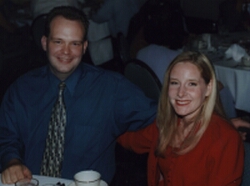Back to Politics
I am working on a complete Foreign Policy screed for the blog, but it has turned into an incredibly long, multi-faceted post.
In the mean time, I'll post this link to an article that I think summed up the first debate perfectly: http://www.spectator.org/dsp_article.asp?art_id=7190
I was originally going to use this as part of my longer treatment of the issue, but it is sufficient to stand alone, and shouldn't get lost in the clutter of the other post (hopefully up by this weekend).
It would be impossible to quote from this article, other than just reprinting it. It is all relevant.
So, I'll just post the text below:
Kerry's Global Warming
By George Neumayr
Published 10/1/2004 12:47:36 AM
John Kerry, the undecided candidate appealing to undecided voters, said last night to President Bush that "certainty can get you into trouble."
For Kerry, uncertainty is a virtue, and it was on ample display throughout the debate. He wasn't certain about Saddam Hussein, saying he posed no danger to the U.S., then saying by the end of the debate that "he was a threat." Kerry wasn't certain about multilateralism, touting it in Iraq, then condemning Bush for applying it to North Korea. Suddenly multilateralist Kerry was rebuking Bush for not being "bilateral" enough and for bringing too many nations into the confrontation.
Kerry wasn't certain about war, opposing sending troops to end the genocide of Saddam Hussein, then suggesting he would send troops to end the genocide in Sudan. Notice how quickly Kerry is willing to use the American military when America's security isn't at stake. His "Darfur" babble was more than just pandering to the Jesse Jacksons of the Democratic party; it revealed Kerry's view of the U.S. military as nothing more than a humanitarian errand boy for the United Nations.
Kerry gave away the game when he said America must "meet the global test" before using force in the world. There it is: Kerry trusts "the world" and mistrusts the United States.
In one respect Kerry is amazingly consistent: he is still the 1960s liberal who wants U.S. troops only "dispersed," as he once put it, under the direction of that global proctor, the U.N.Kerry returned to the rhetoric of his youth often. He talked about a "back-door draft." He spoke disparagingly of American troops whose first act was to protect an Iraqi building dedicated to "oil" -- as if that were as shameful as razing a Vietnamese village.
He made the usual McGovernite bring-the-troops-home noises, even though he used the vacuous phrase "win the peace" repeatedly. Which raises a question: If there was no threat that justified entering Iraq, according to him, what threat would we face by leaving it?
For whatever reason Kerry's not yet ready to unveil a four-month withdrawal plan.
Kerry was forensically steady, but he spent much of the evening on empty bragging and name-dropping, itemizing endorsements from generals, a laughably hypocritical practice for a pol who began his career with pride at opposing them. It was also absurd to hear him brag about being the first U.S. politician to root around the KGB building after the Soviet Union dissolved. What was he doing down there? Perusing the files on his Paris meetings with the Viet Cong?
Gerald Ford was famously lambasted for his ludicrous statement in a debate that "there is no Soviet domination" of Poland. Kerry didn't stumble on that scale, though his knowledge of Polish politics isn't much better: as Bush pointed out, Kerry "forgot Poland" when enumerating America's allies at the start of the war in Iraq. Bush seemed peeved, perturbed, just flat-out irritated at having to knock down MoveOn.org-style propaganda.
The repetitive use of platitudes makes these debates incredibly boring. Kerry had trouble keeping his canned lines straight, invoking Colin Powell's "Pottery Barn" principle. "If you break it, you fix it," Kerry said. If you break it, you fix it? That would be an interesting policy for Pottery Barn to adopt: require clueless customers not to buy broken goods but fix them in the warehouse for hours on end.
Kerry offers the American people a foreign policy based on Pottery Barn principles and "global tests." America, he said, must "earn" the respect of the world again. He reminded the audience that there once was a glorious age when France trusted America so much that De Gaulle didn't even have to verify our satellite photography. "How many leaders" would say the same today? Kerry asked.
America has also lost the respect of Osama bin Laden. Kerry says that America confirmed the validity of his propaganda with "the invasion of Iraq" as he spoke of our troops as shameful occupiers on sacred Islamic soil.America, Kerry said when endorsing military action in Sudan, has a "moral responsibility in the world." But somehow removing the most savage dictator in the Middle East didn't meet it.
George Neumayr is executive editor of The American Spectator.



0 Comments:
Post a Comment
<< Home